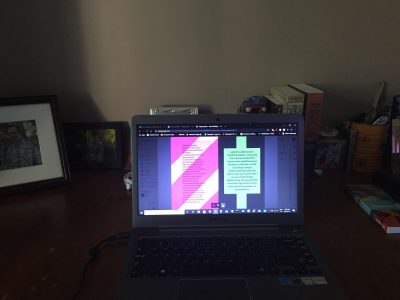
Founders
Ryan Madej has been a writer for over twenty years. His novels have been published by VoidFront Press, JEF Books, and Orbis Tertius Press, and his short stories have been published by Infinity’s Kitchen and Expat Press.
Kimberley Palsat, M.A., has spent several years writing and proofreading in a professional capacity.
Tell us a bit about your press. How did you start? Who are your influences, in Canada and beyond? What is your mission?
The idea for Orbis Tertius Press came from numerous literary conversations between us. A mutual love of books and a desire to spread new forms and style is what led to the genesis of the idea on a cold November afternoon in 2019. As one may have gathered from the title of our press, Jorge Luis Borges and his penchant for labyrinths, mirrors and mysteries is one of our larger literary influences internationally, along with others such as Calvino, Kafka and some contemporary writers working in the experimental and avant garde realms. Canadian works that have influenced the formation of this press would be Wharton’s “The Logogryph,” Gordon Shepard’s “Ha!,” and the late Leonard Cohen’s “Beautiful Losers.” Our mission is to build a space for writers on the margins of literature, mad experimentalists and the avant garde, who want to shake readers’ perceptions of what literature can be.
What about small press publishing is particularly exciting to you right now?
What’s exciting about the small press world now (and in the past as well), is a great freedom to publish the kinds of books many readers want but rarely see coming from larger publishers. In the last handful of years we have seen a great deal of social change and upheaval, the destruction of Old Gods and an embracing of new identities in the cultural landscape. Being in the midst of these changes is an opportunity to seek out these new voices and give them an opportunity to shine.
How does your press work to engage with your immediate literary community, and community at large?
Since we are a small press that has only been up and running in the past couple of months, we’re still building a network to expand our reach. In saying that, we have already taken advantage of our connections to smaller presses such as JEF Books, Voidfront Press and others to find new talent. Here in Edmonton we’re becoming acquainted with the Writer’s Guild of Alberta, advertising and connecting with local writers who have similar artistic inclinations. Our hope in the next year is to build relationships with independent bookstores and libraries so our work can be showcased.
Tell us about three of your publications. What makes them special, needed, and/or unique?
This September we are going to be publishing our first book of poetry by Rus Khomutoff, a chapbook of surrealist verse. In the last few years there has been a resurgence in readers’ interest in poetry, and at least within our circle of writers and readers, experimental and boundary breaking poetry. Rus’s collection breathes new life into the form and it has renewed our interest in poetry as well.
One of our other intentions with Orbis Tertius has been to find and reprint lost and forgotten gems of the literary past, and our forthcoming publication of “The Third Bank of the River & Other Stories” by João Guimarães Rosa will introduce today’s readers to a Brazilian master who was a contemporary of fellow Brazilian phenom, Clarice Lispector. World literature is dear to our hearts here at Orbis Tertius and we believe that introducing these works to the reading and writing public will serve as inspiration, or at the very least an introduction to some fantastic writing of the past.
Our first publication early this year, “The Marianas Trench,” is the first in a tetralogy of experimental fiction/non-fiction that blurs the lines between fiction and reality while also digressing into literary theory, popular culture and the occult—a heady mix that fulfills the mandate we have set out from the beginning. Its uniqueness is that it continues the traditions of the modernist and postmodernist schools that sought to present individual consciousness in new and exciting ways.
How have the current multiple global crises impacted your work with the press?
The current world situation has in many ways helped our burgeoning literary press, as it has allowed us time to formulate plans for the future, read submissions in a timely manner, network online, and conduct other related research and work for the press. The global crises are highlighting underrepresented voices in literature which we find particularly encouraging, especially considering that Ryan, one of our founders, is a Métis writer. So far we have only seen the positives of working during this unprecedented time, and we sincerely hope that this trend continues once life has achieved a level of normalcy.



